If you follow the local news or keep up to date with the developments in the real estate sector, then you have an idea of how deep fraud has taken root. Kenya has again been put on the grey list mainly because of our real estate sector. The grey list refers to countries that have deficiencies in dealing with money laundering and terrorist financing. Kenya’s real estate is believed to be encroached by criminals from Somalia in a bid to clean dirty cash from piracy and other illegal activities.
We’ll discuss the impact of the grey list in another article. Today, we are focused on the fraud that directly affects you when buying property in Kenya and how to avoid it. However, before we discuss the tricks fraudsters use to defraud you, there are THREE pieces of information that I believe are important to note.

Some of these facts may not be news to you if you are updated on property matters or follow our posts closely.
1️⃣ According to a 2023 report by the Ministry of Lands and Physical Planning, over 3,000 land fraud cases were reported nationwide.
2️⃣ The government recently reported the theft of over 367 security papers used to print title deeds.
3️⃣ The DCI’s Land Fraud Investigations Unit recently charged 10 people with fraud in an over 1 billion shilling land deal in Nairobi.
➡️ Among the ten was a Registrar of Titles at Ardhi House, and a Land Administration officer, who were further charged with abuse of office.
This is how deep fraud goes. There are criminal elements everywhere, even within institutions that are there to catch these criminals.

It would be advisable for anyone to avoid buying property in Kenya altogether, but this is what they call ‘throwing the baby together with the bath water.’ Real estate remains one of the most lucrative investments in the world, and any serious investor has some real estate in their portfolio.
As lucrative as it may be, we cannot ignore the fact that land and property fraud is becoming more sophisticated as criminals craft new ways to exploit unsuspecting buyers. However, there is one thing criminals rely on to succeed in their endeavors. They rely on ignorance.
Criminals rely on your lack of knowledge or information on the property purchasing process or the scams they propagate. Your best defense is to have as much information as possible on property transactions and the scams at play.
Note: We have a lot of information on property transactions and even how to conduct your due diligence. You will get all this on our website, blogs, or social media pages. For this article, we will focus on the common tricks fraudsters use to defraud property buyers as promised.
The list of tricks is quite long as we try to give you as much information as possible. To avoid making this post longer than it should be, we will provide links to our social platforms, under every post, where you can find the full post and dive deeper to learn exactly how to protect yourself.
We also understand that this is a long post, and you may not have the time to go through it all. Please save the link and return later, or you can go directly to the scam you feel you need to know more about. Happy reading, and share this with friends and family as you find it useful.
We begin with the most prevalent scam…IMPERSONATION.

The Impersonator
This is one of the most common scams of all. It is also used to enable many of the other scams we will unveil in this post. Impersonation is the oldest trick in the book of cons, yet many Kenyans continue to fall for it. For this, fraudsters come prepared with fake ID cards, forged signatures, and some even pretend to be family members of the real owner. But as simple as it looks, the scam is well orchestrated, and before you know it, you are buying property from a stranger who has no legal right to sell it. Find out more about how the scam works and how to protect yourself by clicking any of the links below for the full post.
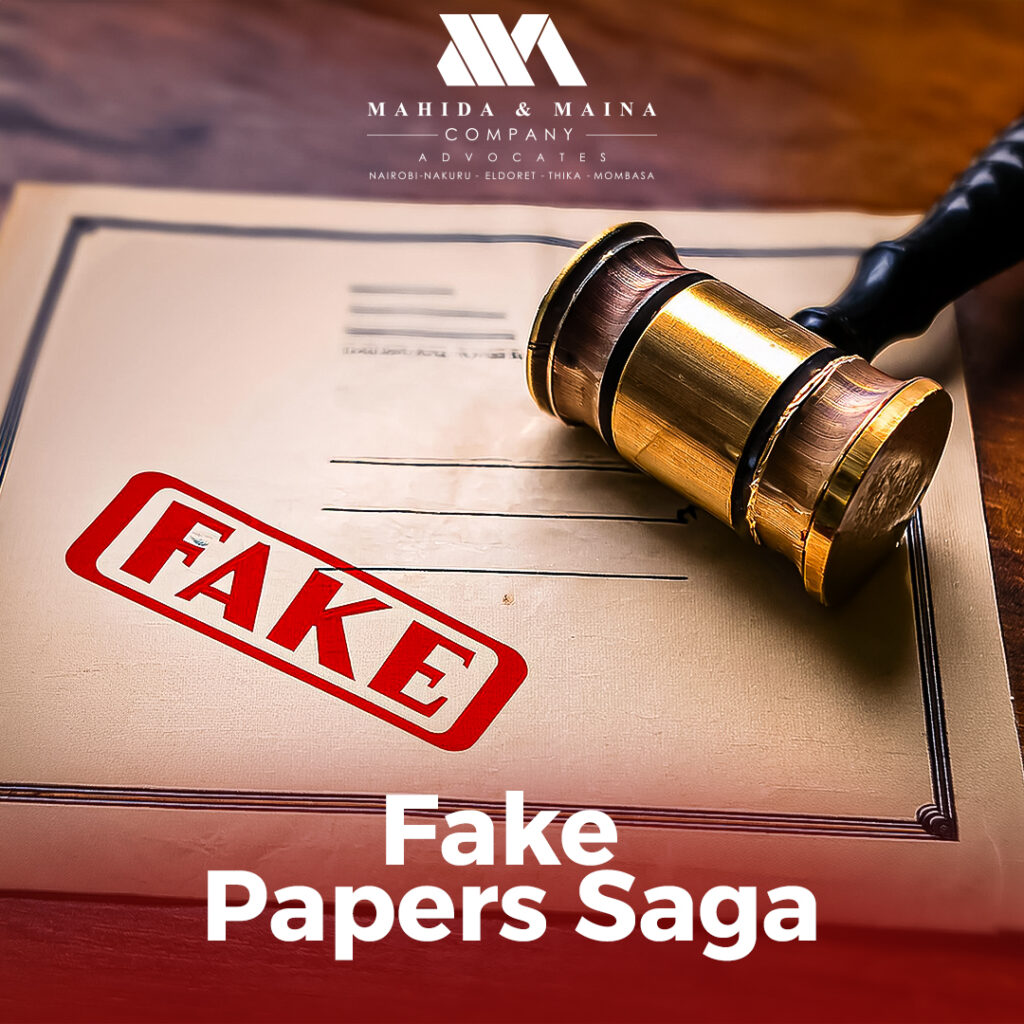
Fake Papers
Unfortunately, we are finding ourselves in a time where a title is not enough to prove ownership when buying a property. There is a substantial number of title deeds in circulation that are either forged or obtained illegally through corrupt means. These ‘title deeds’ are made to look authentic, complete with stamps, seals, and signatures. Find out more about these titles and how you can protect yourself in any of the links below.
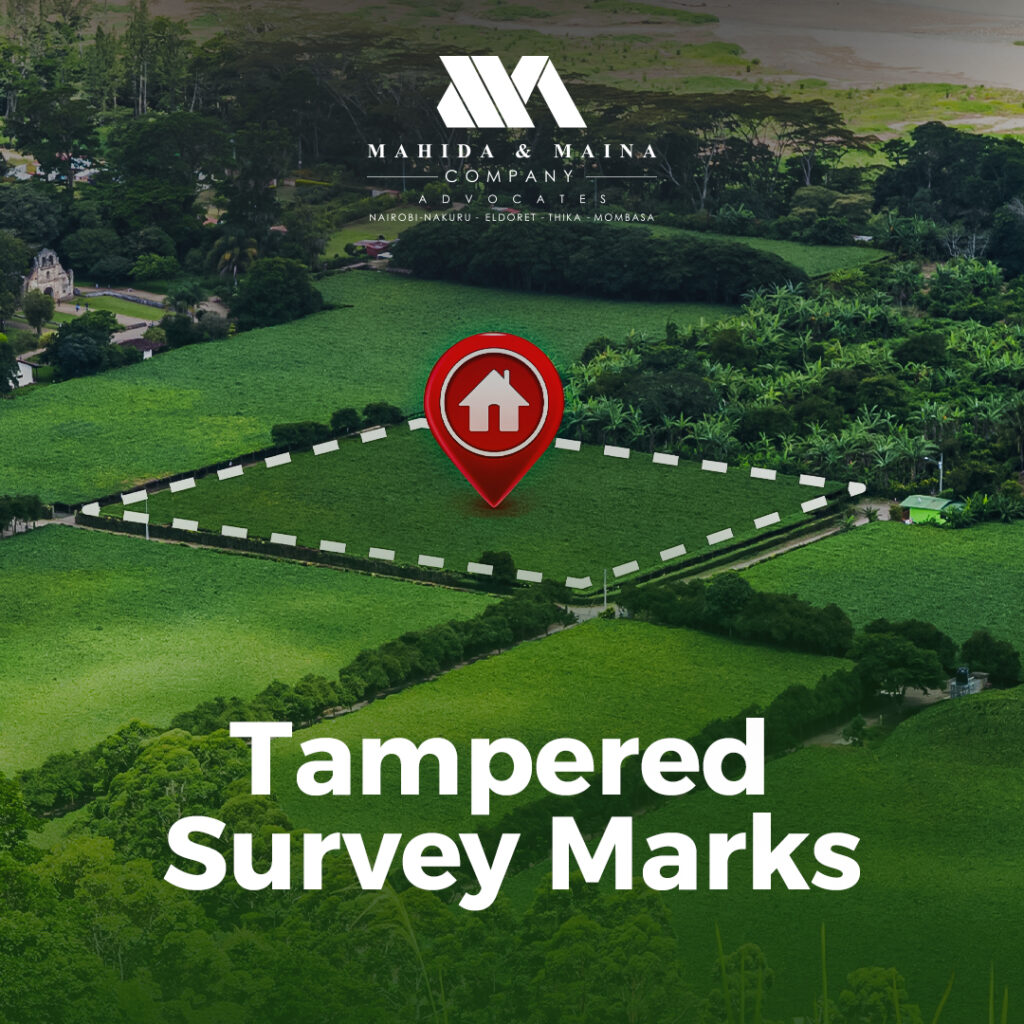
Survey Marks
Land fraud is not limited to the paperwork. Some fraudsters physically tamper with survey beacons or maps to alter the actual size or location of a plot. You will be shown what looks like a legitimate boundary on paper, but on the ground, you will find things are different. The full post reveals this trick and instructs you on what to do during a site visit.

Stealing from the dead
You’d think fraudsters are only interested in those in the land of the living, but as we have discovered, they will cross over to the other side if it means having a payday. Fraudsters rush to sell land owned by someone who recently passed away before their beneficiaries realise what is happening. There are many cases in court like this where someone is contesting a piece of land belonging to a deceased person. Learn more about how this scam works through any of our social platforms below.

Selling Air
The digital world has opened new opportunities for scammers to exploit hardworking Kenyans. Many have been conned through enticing listings online for plots in prime areas, complete with photos, coordinates, and stories that make it all sound legitimate. Our post will enlighten you on how to safely navigate online land listings without falling for digital traps.

Off-Plan Scams
Off-plan developments can be an affordable way to own property. It is also a ripe harvest for fraudsters to reap from uninformed buyers. Off-plan scams are new, and many Kenyans have lost millions paying for homes that were never built. Discover how the scam works and how you can tell a genuine project from a fake one.
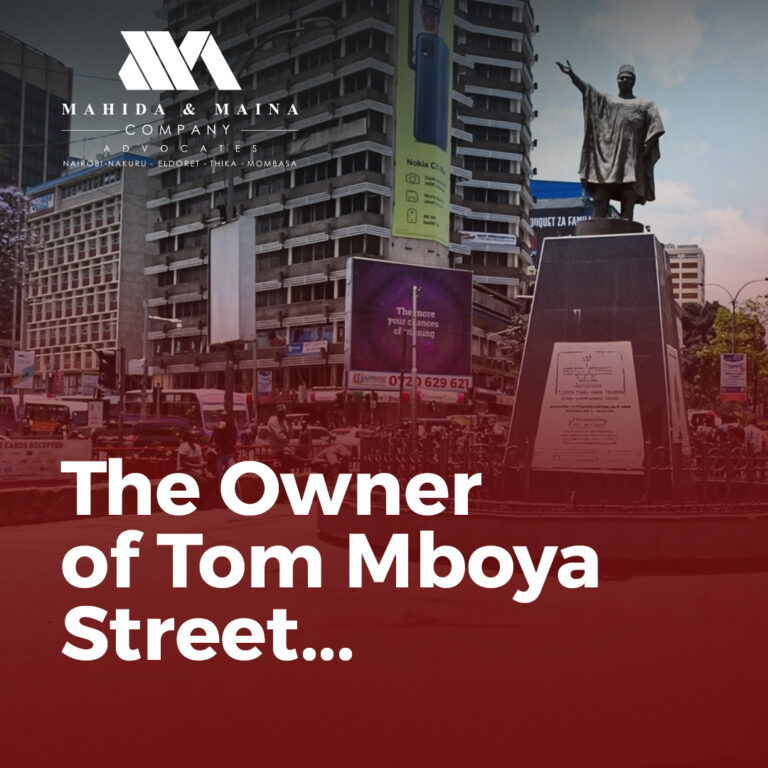
Tom Mboya Street
This is both a funny and sad tale of someone who bought a roundabout. It’s okay to laugh or sympathise with him, but you should make sure you don’t find yourself in the same predicament. In this eye-opening post, we revisit the infamous case of the roundabout and guide you on how to avoid buying public land.

Cheap Scam
Many people are always out to get ‘good deals’, and fraudsters take advantage of this by offering unrealistically low prices to lure unsuspecting buyers into hurried, risky deals. A word of caution in land transactions…a price that’s too low should be a warning sign, not a reason to celebrate. Learn how to access a good deal for properties in Kenya by reading the full post.

Online Scams
This post builds on the fraudulent property listings online. It goes deeper into online property scams through phishing websites, identity theft, and other ways fraudsters exploit technology to con you. Learn how to stay alert and protect yourself from online scams.
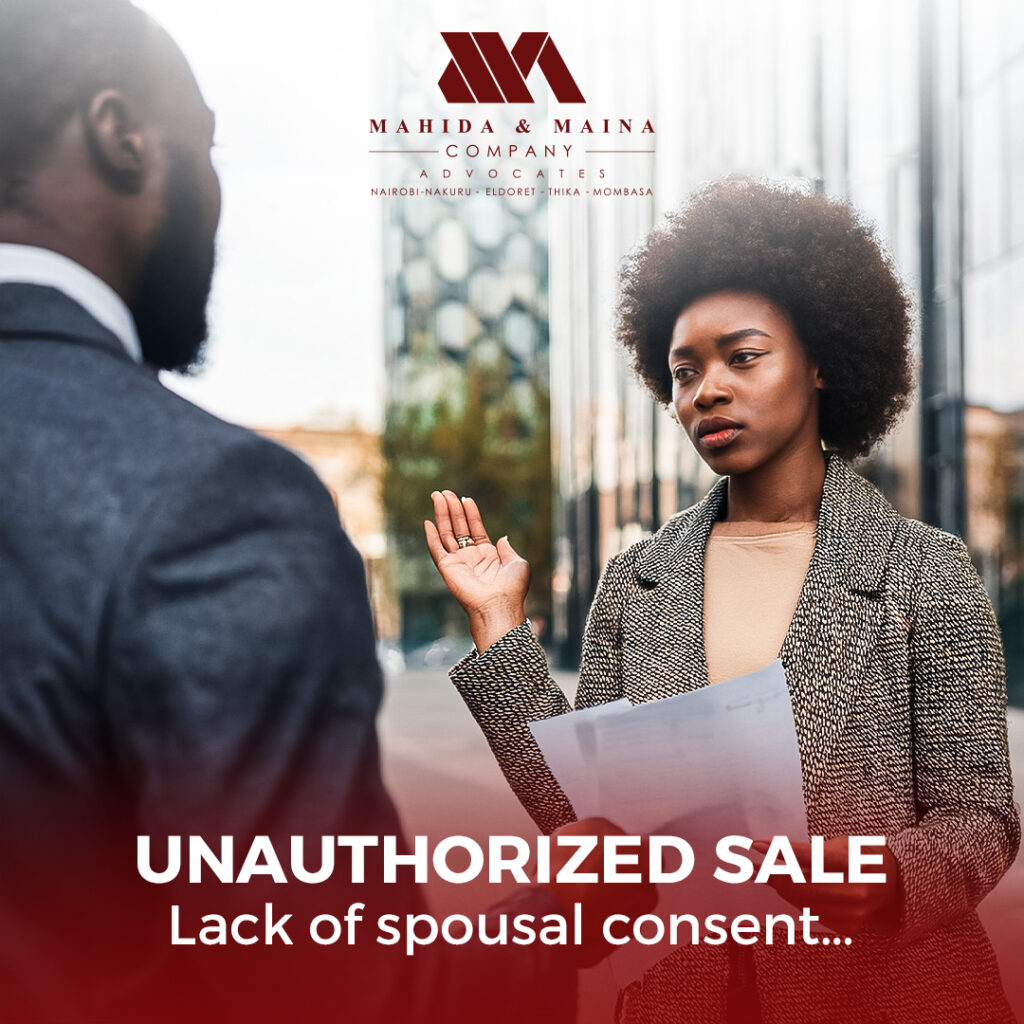
Matrimonial Property
This is not necessarily a scam, but it could potentially drain your money or drag you to court for years without redress. It is not common knowledge that selling matrimonial property without spousal consent is not only unethical but illegal. Many buyers unknowingly purchase property owned by a married couple, only for the other spouse to challenge the sale later. Learn how to avoid buying such property and what to do instead.

Unauthorized Sale
Property owned by a group or managed by a board is seldom ever sold by one person acting alone. Even if the seller is part of the group or board, they should have undeniable proof of consent from the other members to have administrative rights over the said property. The full post explains how to verify group or board consent and why communal approval is crucial.

Disputed Property
This scam is one of the most dangerous for one major reason. The fraud is not only carried out by fraudsters but also by ill-willed owners and custodians who sell property with loans, inheritance issues, among other disputes, hoping to get their money quickly and transfer the ‘property problems’ to the buyer. The full post explains how to spot the red flags early and protect your investment.

Double Selling
This is also another dangerous scam because it is primarily propagated by the genuine owner. The owner sells the same piece of land to more than one buyer. The buyer(s) realise this late when someone else shows up claiming ownership. Learn more about double selling and secure your hard-earned income from these greedy, non-remorseful individuals.
As we said at the beginning of this post. It would be wise for someone not to invest in properties in Kenya; however, this would be one-sided. Land scams thrive on ignorance, urgency, and misplaced trust. With the right information and safeguards in place, you can comfortably enjoy the proceeds of your real estate investment.

Below are some KEY takeaways from the series…
VERIFY EVERYTHING: Always check title deeds, spousal consent, survey marks, and approvals with official channels like the Ministry of Lands, Ardhisasa, or local authorities.
ENGAGE PROFESSIONALS like licensed advocates, surveyors, or real estate agents to guide your transactions.
AVOID RUSHING into deals, especially ones with unrealistically low prices or sellers who discourage due diligence. If something feels off, investigate further.
CONDUCT thorough DUE DILIGENCE before making any payments. And make use of escrow accounts for payment for extra protection.
STAY UPDATED on real estate matters and learn from other people’s experiences.
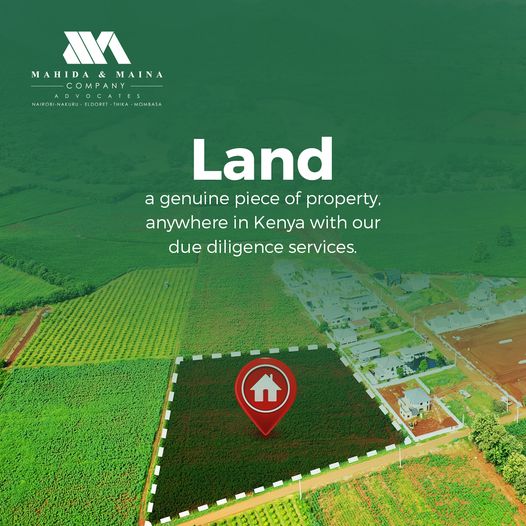
PS: The post is NOT meant to be a substitute for professional legal advice. Use it for general information only, but remember to engage professionals where needed.
Feel free to go through our website for more informative content and learn more about who we are and what we can do for you. Also, take time to read each of the full posts linked above. Share them with your family and friends. You’ll never know whose future investment you could help save.



